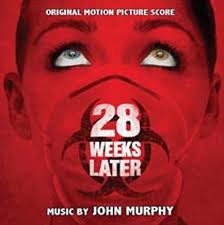

This follow-up to Oscar-winner Danny Boyle’s apocalyptic zombie opus 28 Days Later features the return of composer John Murphy, who expands upon that film’s gritty score to accommodate sequel director Juan Carlos Fresnadillo’s continuing vision of doom. What sets this involving score apart from most zombie music is its emotional core: namely, a strong and memorable theme. First available from iTunes, this limited edition release of 1,500 units adds an extra 10 minutes of material that’s essential to the enjoyment of the score.
“As a film composer, you want to try to bring something else to the table. You cannot just double up what we’re already seeing and hearing on the screen. So on 28 Weeks, I experimented with these long, slow atonal crescendos that started out from nothing, or maybe just a filtered rumble. And by creating a new arc that was often contradicting what was happening in the scene, a lot of interesting things would happen. And it was a great device for building tension in a very cinematic way,” Murphy elaborates in the album’s extensive liner notes—and in a 13-minute audio interview—on his approach to illustrating a zombie-infested London decimated by a feral virus. While similar to the ethereal dream cycles of musicological guru Brian Eno, whose beautiful composition, “An Ending (Ascent),” was featured in the first film, Murphy’s singular New Wave noir voice stands prominently on its own. Although assorted studio manipulations are employed profusely with the aid of engineer Tyler Barton, 28 Weeks Later ultimately embraces progressive rock, electronica and ‘80s Euro-horror stylings while remaining unique and invigorating. The classic Mellotron keyboard is used extensively, lending the proceedings a sort of ghastly neo-retro flavor. Additionally, a 20-piece string section recorded in Prague under the direction of Jiri Kubik (“...Hollywood felt so big and clean,” Murphy reflects) is seamlessly blended, and ultimately compressed and fused with hardcore guitars and intense electronics.
The terror of the “Cottage Attack” begins the album on an abrasive note, as grating electric guitar, pounding drums and brittle electronic tones assault our nervous system. The evocative “28 Theme” follows, opening with a melodic line for piano that establishes the remoteness of London and its remaining survivors’ plight. The track is slowly accompanied by a mélange of wispy electronics, acoustic guitar and drums, as the theme emerges confidently yet with an underlying indication of instability. Succinctly conveying isolation, Murphy reprises the tune effectively in many of the subsequent cues. Stark and eerie, “Welcome to Britain” is comprised of pinging electric beats, assorted distortions, guitar samples and synthesizer. Solo piano and electronics later conjure visions of a “London Deserted.”
During the “Firebombing London” sequence, whispering electronics and spatial piano warp classic spacemusic textures for a most horrific scenario. Exclusive to this release, the quietude of a “Scooter Through London” conjures vast spatial expanses with Mellotron and a sustained electronic pulse that’s both serene and scary. “Going Home” underscores an urgent journey via tapping electronic percussion and varied abrupt rumbling sounds. A hovering spectre of bulging masses and recessed voices is abruptly obliterated by searing processed guitar when it’s discovered that “Alice Is Alive!” The meditative “Don Abandons Alice” reprises the main theme with a leisurely backbeat against emerging, raw guitar lines that expand aggressively into a flaming six-string inferno. The pure, tingling horror of “Night Watch” evokes memories of Tangerine Dream’s Near Dark, followed by the Goblin-styled fury of “Go Go Go!” and the alarming “Code Red.”
The “Walk to Regents Park” offers a tranquil layering of slow, horizontal electronic tones that progresses into a mix of guitars and marching percussion, all submerged in fuzzy, abstract sound waves. An ominous prelude of minimalist guitar growls underscores a “Crowd Break Out,” unleashing chilling waves of sound that ascend until dissolving in a miasmic cloud of eternal silence. An unnerving and calculating veil of doom prevails during “The Depot,” with all encompassing, low-pitch emanations traversing slowly through the cue.
All hell breaks loose, musically and otherwise, with the intensity of “Helicopter Mayhem”; dominated by suspenseful rhythms for whirring, processed guitars and “choppy” feedback, this standout cue is another example of Murphy’s compositional and technical dexterity. The solemn “Andy’s Theme” offers a rich variation of the main theme, with whistling synths awash in an unshakable, funereal ambiance. The theme returns with the discouraging, guitar-driven tones of “Leaving England,” followed by the aptly titled “Hymn to England,” neatly ending the score with a haunting piece for light bells bolstered by weighty rising and falling synthetic timbres.
Given this CD’s elaborate presentation and wealth of quality music, this latest incarnation of 28 Weeks Later probably won’t remain in print long.
In closing, Murphy enthuses on the current scoring scene; “A film composer is only ever as brave as he is given license to be. And with Danny (Boyle) and Juan Carlos, I was given a hell of a lot of license…. They’re part of a generation who realizes how potent it can be to push the boundaries with music in film…and that’s great for all of us—composers, filmmakers and audiences. It’s an exciting time to be a movie composer.” And if this stellar release is any indication, it’s an equally exciting time for film score aficionados.
(Originally published by FilmScoreMonthly 2009)